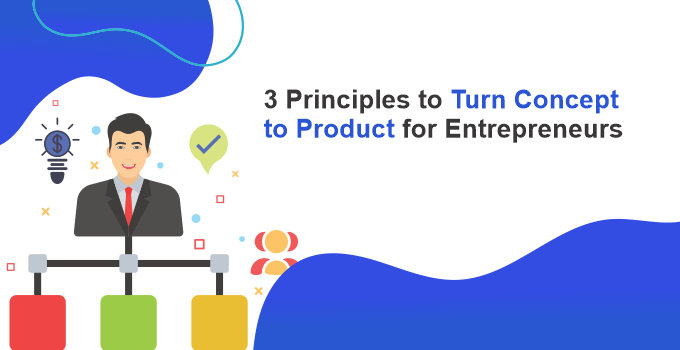3 Principles to Turn Concept to Product for Entrepreneurs
Starting, managing, or growing a business involves numerous elements that often dictate whether a venture will succeed or fail. Many entrepreneurs struggle with these aspects of business strategy and operations, especially in the early stages. Here’s how to move forward effectively.
1.Validate Your Idea with Market Research
Rather than creating a solution in search of a problem, identify existing challenges in the market. Often, the most innovative-seeming ideas are not practical business-wise.
During the ideation phase, consider reversing your approach: look at successful businesses and understand why they succeed. They address clear, existing problems. By aligning your product with real consumer needs and existing market trends, you significantly increase the likelihood of your business succeeding.
We have seen far too many entrepreneurs rush into markets, enamored with their ideas, forgetting the fact that the market has no sentimentality,” he said. Of course, Amazon wasn’t the first into the e-book market, but they did excel by simplifying the process. Also, avoid these big mistakes when you start your business.
2.Develop a Minimum Viable Product (MVP)
To evaluate your product, develop a minimum viable product (MVP) or a prototype that aligns with your industry and business goals, and release it to the market. The insights gathered from this process are crucial; they will not only refine your product but also help pinpoint your target customer segment, among other strategic benefits.
Receommended for You: WhatsApp Channels What Does The Latest Update Say?
3.Consider Strategic Partnerships and Outsourcing to Grow Your Business
One has to consider the different benefits a strategic partnership may provide for multiple aspects of business operations and customer services. That is why so many businesses opt for outsourcing rather than having all these offices in-house because it’s too expensive.
Ira Horowitz, chairman of City Global, describes the advantages of outsourcing and forming business partnerships. “The market for outsourcing is growing at a phenomenal speed as businesses realize its monetary advantages and its role in enabling them to focus on their key strengths.”
City Global is an exemplar of effective strategic partnership deployment. Founded in 2009, this business concierge service manages the whole process of development and delivery for its clients. Essentially, if the right partnerships have been formed, a product will then move more effectively – and more rapidly.
People also Read: 14 Most Annoying Reasons Why Your Google Ranking Dropped
4.Create a Scalable Go-to-Market Strategy
When things are going great in the business, you may want to add more features or update your product so as not to get left behind and lose control of your market. Do not forget the focus and energy in your early days of ideation; ensure there is real market need before any updates or added features.
Consider the difference between Facebook and Craigslist. When Mark Zuckerberg first launched Facebook, it was a very basic site with limited functionality, which made it easy for users to get on board. For two decades, features on Facebook have been added only gradually but only when the need had been clearly communicated by its users. Craigslist has hardly changed since its conception and is so popular today principally owing to the simplicity of its user interface.
Startup Tip
Do not overcomplicate your product. Simplicity and ease of use should be at the top of your list in both product development and iteration for maximum adoption. Change only that which a market demands, so that your product remains relevant to the right needs. Do not force innovation for innovation’s sake-thereby pushing that innovation further from your market.
As industries evolve and entrepreneurship advances, it is important to be up-to-date with the current trend; however, one should not forget the proven business fundamentals. These help provide a foundation that will stand the test of time and the wind of change in any business.



